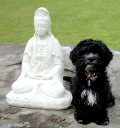 Learning to Meditate is like Training Your Dog.
Learning to Meditate is like Training Your Dog.
Meditation simply means becoming familiar with your mind. Traditional descriptions often compare our minds to a wild monkey jumping from branch to branch or an elephant that creates destruction as it rampages. Unfortunately, I don’t really have direct experience of monkeys or elephants. I do have experience trying to train my dog as do many of us.
I have a rascally dog who failed to learn how to “come” despite at least three dog training courses. Her house training took so long I began to think perhaps she simply wasn’t bright. But it was in both our interests to succeed at training so we kept going. I am often told by students that they are “not good at meditation”. This is a similar rush to judgment. We all want peace of mind so it is in our self interest to persevere.
at least three dog training courses. Her house training took so long I began to think perhaps she simply wasn’t bright. But it was in both our interests to succeed at training so we kept going. I am often told by students that they are “not good at meditation”. This is a similar rush to judgment. We all want peace of mind so it is in our self interest to persevere.
Meditation begins with training your mind to focus, which is a lot like dog training. Getting my dog to come on command seemed to be hopeless. After much failure, I started a routine, treats and a long leash. My dog and I had training sessions at 4pm every day. We would go out in the yard and practice. If a squirrel passed she would be off in a flash chasing it, or if a scent was intriguing she would get lost in it. I would say come and she would get a treat if she actually did. She would be on a leash so that if she did not come I could give her a gentle tug on the leash.
We don’t offer ourselves treats in this scenario but setting a routine is definitely helpful. The first instructions in meditation are to concentrate on an object, a pebble, candle your breath. This is actually quite difficult as thoughts rush through our minds like Niagara Falls. Memories, hopes and fears draw our attention like multiple squirrels. We drown in anger and desire like the scents. The commitment to pay attention for a short period of time however, is our long leash. However far we drift, when we become aware of losing the object of attention we return.
Most important however, is attitude. I had to make it fun for my dog. If I got frustrated, irritated or impatient, any training was futile. She would give me a pained confused look and get resistant. The tone of voice was crucial, it had to be always loving. This is true for meditation. Often we are not aware how harsh and judgmental we are towards ourselves. As the end result of meditation is as open refreshed relaxed, mind; harshness is counter productive.
Everyday the training session had to be a fresh start with no expectations other than we would “play“ for 20 minutes. My dog still expects a play period around 4pm every day. Although my dog does not come at every call, she responds well to communication and we keep working at it. After many years of meditation, I could say the same thing about my mind. Never giving up, I just keep using our daily play time!
